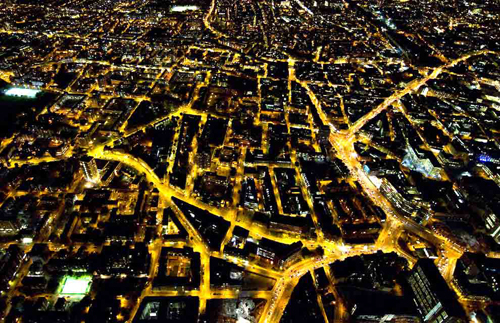Light pollution needs regulation, say Lords

Lighting is a ‘neglected’ pollutant which needs regulation, says a report from the House of Lords.
It contributes to a range of adverse health outcomes including heart disease and premature death, yet light is poorly understood and poorly regulated and the Government’s approach is ‘confused’.
Despite the common experience that light pollution is getting worse, there is no central UK monitoring of the problem, but rather citizen science and satellite imagery. This makes understanding the sources and impacts of light pollution difficult. More research is needed into measures of exposure to light pollution, especially indoors, to quantify the effects on sleep and health. Research could also usefully be conducted into the positive effects of light on health, for example through light therapy to improve sleep.
The report says that noise and light ‘sit uncomfortably’ under the aegis of pollutants regulated by the Department for Environment, Food and Rural Affairs (DEFRA). The 25 Year Environment Plan briefly mentions noise and light pollution, but with no specific targets and seemingly little impetus from central government to address them.
DEFRA should lead the development of analysis for noise and light pollution in order for the next five-year Environmental Improvement Plan to include specific targets for their reduction, setting an overall framework for regulation. Noise targets should focus on reducing the overall burden of disease with targeted interventions. For light pollution, setting a target will require quantification of the problem—through an agreed methodology—and monitoring. The Government should explain how regulatory and policy action on noise and light pollution will be used to deliver the targets. The five principles for good environmental management set out in the Environment Act 2021 and the Environmental Policy Principles Statement should be applied to the management of light and noise pollution as well.
‘It’s great that the House of Lords is discussing light pollution,’ says Rory Marr, associate environmental lighting designer at Hoare Lea. ‘It helps highlight the challenges that need to be considered if we truly want to tackle the problem. The fact is, light pollution isn’t something new that just appeared overnight, so it would be foolish to think there’s a quick fix.
‘It’s important that we have a long-term lighting strategy that not only helps manage future developments but, more importantly, supports ways to address our current legacy of infrastructure. Having a planned pragmatic and consistent approach across the UK, with manageable targets and realistic aspirations, must be the way forward, surely.’
• Don’t miss Circular Lighting Live 2023, Recolight’s flagship conference and exhibition taking place on Thursday 21 September 2023 at the Royal College of Physicians in London. Free to specifiers, Circular Lighting Live 2023 will feature leading experts, specifiers and policy makers who will share their insights into forthcoming standards and legislation, emerging technologies and new business models. For 2023, the organisers have moved to a bigger venue with more expansive exhibition floor and included a dedicated track for lighting designers. More info: www.circularlighting.live


